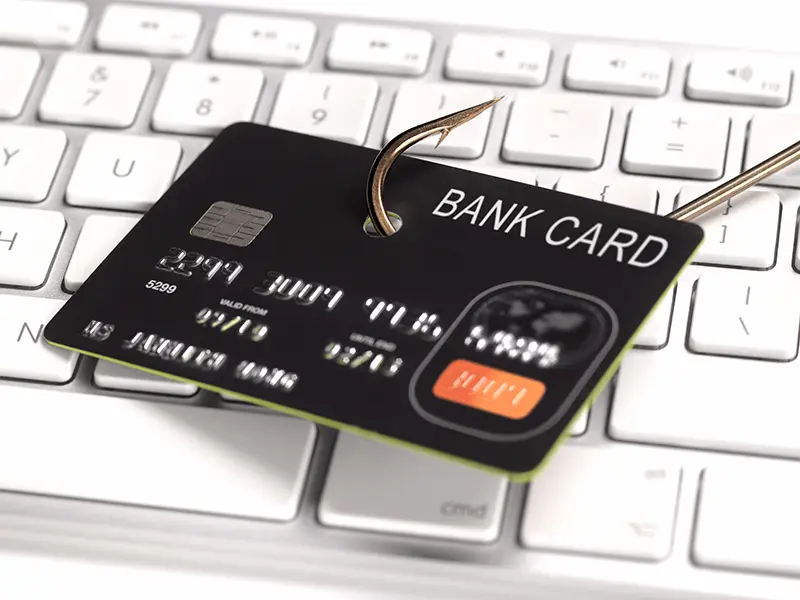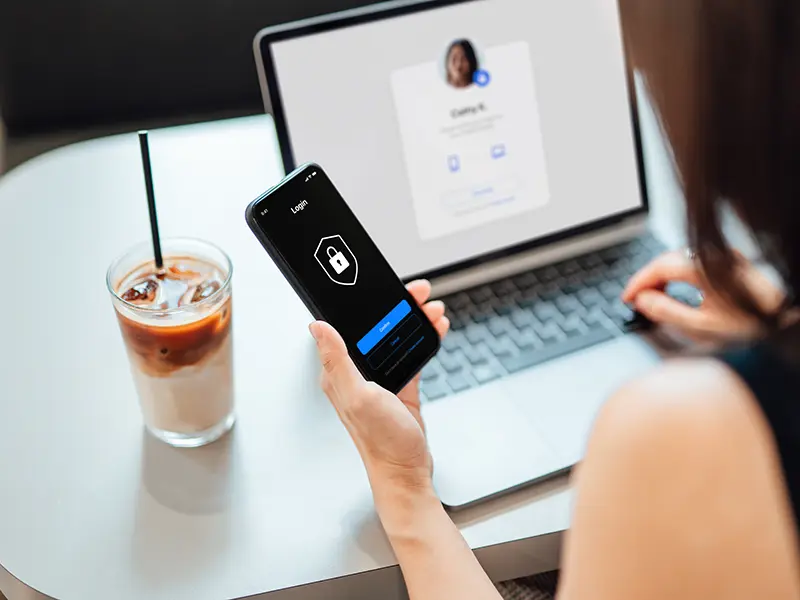Unfortunately, there are people out there who make a living through cybercrime and financial scams - hacking into financial accounts, stealing account information and preying on people's emotions with deceptive heartfelt stories or scare tactics. And the various types of these activities continue to grow. Read on to learn about some of these malicious acts and tips to protect yourself.
For additional tips to keep yourself safe visit www.banksneveraskthat.com.
Account Takeovers
Account Takeovers occur when criminals gain control of bank account(s) by stealing the victim’s online banking credentials. Although there are several methods of stealing credentials, the most common involves malware that has infected a computer.
Once credentials are stolen, accounts are accessed online and unauthorized transactions may result. To reduce your risk, follow these tips:
- Install, update, and maintain good quality anti-virus and anti-spyware software
- Make sure your security questions are not easily guessed and keep the answers safe
- Maintain strong passwords
- Watch your statements closely and report any unauthorized payments or withdrawals to your financial institution immediately

Email Account Takeover
Every day thousands of people are victims of “Email Account Takeover” through their personal web based email accounts. Criminals then send messages from that e-mail with links or attachments that contain malware which may lead to an account takeover.
A prevalent scam involves the attacker using the victim’s email account to send messages to their bank or other financial institution. These messages usually indicate that the victim urgently needs account balances, and then may request to transfer money from legitimate accounts. The criminal assumes the identity of the e-mail account holder and states that a serious and/or urgent issue has occurred and has prevented the victim from using their normal bank process to transfer money.
Conversely, emails may be “spoofed” or sent from email accounts that were taken over by scammers. They might send links for you to click on, spam for you to read, or pretend to be a person in need. Be wary if something seems out of character with the sender. When in doubt, call the sender to confirm what was sent.
To prevent this from happening to you, follow these tips:
- Beware of emails that ask you to click on a link. These links may install malware, which allows thieves to spy on your computer and gain access to your information.
- Be suspicious of email requests to update or verify your personal information. Legitimate organizations would not solicit updates in an unsecured manner for information they already have.
- Confirm a message is legitimate by contacting the sender. It is best to look up the sender’s contact information yourself instead of using the contact information in the message.
- Assume that if an offer seems to be too good to be true, it probably is.
- Beware of any offer that pressures you to send funds quickly by wire transfer or involves another party who insists on secrecy.
- Be suspicious if someone contacts you unexpectedly online and asks for your personal information. Be especially cautious if there are typos or other obvious mistakes.
Fake Checks
There are many variations on the fake check scam. It could be a Secret Shopper "Job Offer", someone buying something advertised, paying you for work, a sweepstakes you supposedly won, etc. Scammers hunt for victims and then send fake checks that draw money from an account that doesn’t belong to them or doesn't exist.
To avoid becoming a victim, follow these tips:
- Throw away any offer that asks you to pay for a prize or a gift.
- Avoid any correspondence regarding foreign lotteries, and any phone calls or e-mails stating that you’ve won a prize from a contest you don’t recall entering.
- Know who you’re dealing with; never wire money to strangers.
- If you’re selling something, don’t accept a check for more than the selling price.
- If accepting a check, request a local bank so you can make a personal visit. If that’s not possible, call the bank to check the validity.
- If the buyer insists that you wire back funds, end the transaction immediately. Legitimate buyers won’t send you more than you are asking and pressure you to send money by wire transfer services.
- Resist any “act now” pressure, if the buyers offer is good now it should be good in a week.

Internet Purchases
Scammers can easily “set up shop” on the Internet with little effort. Purchasing from disreputable sources can cause credit card theft, delivery of sub-par goods, or simply defraud you by not shipping purchases.
You can avoid trouble by following these tips:
- Know who you’re dealing with. Avoid purchasing from links in spam or web searches, look for positive online reviews.
- Know what it will cost and never send cash or allow “overpayment”.
- Pay by credit card for better protection.
- Don’t email your financial information, email is not a secure transmission method.
- Keep a paper trail. Keep receipts and monitor your accounts for correct withdrawals.
Malware
Generally described as malicious software, Malware includes several different computer threats such as viruses, spyware, or trojans, and is mainly engineered to steal personal information or gain access and/or use of your system.
- Virus: Infects digital files or computer processes, can spread from computer to computer or can come from websites.
- Spyware: Engineered to steal personal information or spy on your activities. Generally does not spread from computer to computer, is sometimes brought by being packaged with other useful software, “helper” applications, or web browser toolbars.
- Trojans: Software packaged with a harmful but hidden component, made attractive to consumers by promising something useful. The victim voluntarily installs the software.
There are a number of ways that malware can be brought to the computer, but the most common ways are through email and webpages. Simply surfing the web to a page that hosts malware can cause problems as well. This can capture what you type, screenshot your computers activities, and even control your computer without your knowledge.
“Banking Trojans” can stay silent and then selectively activate when online banking services are used. They can change how certain websites look and add screens that look as if the website is requesting personal information to validate you, impersonate a warning about the site being “unavailable”, or even direct you to a completely different site.
To prevent this from happening to you, follow these tips:
- Keep your computer up to date by installing software updates. Pay close attention to “plugins” like Flash, Java, and Acrobat Reader as you may have to update these manually. Malware may use outdated versions of these plugins as a gateway to infect your computer.
- Install, configure, and update a quality software security suite. Be sure that the product contains multiple protection methods, including anti-virus, anti-spyware, and web protection.
- Don’t ignore warnings from security software.
- Consider using a dedicated computer for financial needs and keeping the computer updated and secure.
- Only install reputable, legal versions of software on your computer.
- Don’t change computer or Internet browser settings to values that weaken security.
Mobile Security
Mobile devices are essentially powerful computers with a small screen, which need the same precautions as regular computers. Follow these tips to help protect yourself:
- Set a security lock on the device.
- Be aware of your surroundings. Don’t type passwords for your accounts while people may be watching.
- Don’t connect to untrustworthy, unknown, or “open” (no security) Wi-Fi networks.
- Keep your device up to date with the latest version of the operating system available.
- Don’t allow your device to install applications from “unknown sources”.
- Install a trustworthy antivirus program and scan your device for viruses regularly.

Online Romance Scams
After a period of time spent on online dating sites building a connection with a new found “friend”, they may ask you for money. In addition to losing money, you may unknowingly find yourself taking part in a money laundering scheme by cashing phony checks and sending the money overseas.
Your new found “friend” may only be interested in your money if he or she:
- Pressures you to leave the dating website and communicate using personal email or instant messaging.
- Professes instant feelings of love.
- Sends you a photograph of themselves that looks digitally manipulated or from a glamour magazine.
- Claims to be from the US and is traveling or working overseas.
- Makes plans to visit you but is unable to do so because of a tragic event.
- Asks for money for a variety of reasons.
- Coaches you on how to respond to others who ask you about monetary requests made to you.
- Requests you to open new financial accounts to allow for easy money transfer.
- Asks for your online financial account(s) passwords and usernames to check on your balances or make money transfers directly.
Definitions
Phishing
Fraudulent attempt to obtain account information done via email. The email directs customers to click on a web link and tries to trick them into submitting login credentials or other personal information to scammers.
Phishing may have the following hallmarks:
- Unexpected email that warns of some consequence. This may have a clickable link that takes you to a lookalike site.
- Poorly worded or confusing terminology in the text.
- Promise of reward or refund, with a clickable link to a lookalike site.
- Lack of personal information in the email. Things like account details are very generic.
SMSishing
Scammers use text messages to defraud or steal personal information. This issue can appear to be very generic and indicates trouble with your account, requesting you to call a number or open a link. Don’t respond if you get a message that asks you to call a phone number to update your account or give personal information. If in doubt, contact your bank. Report fraud attempts to your cellular communications provider and local law enforcement.
Social Engineering Scams
Can take many forms, phone calls, email, paper, even face to face and may include a cleverly worded email that piggybacks on newsworthy events, or web links that pretend to be charities after major disasters.
To protect yourself, follow these tips:
- Ignore spam.
- Stay away from fake check scams.
- Keep up to date on current scams.
Spam
General term for unwanted “junk” email. Links or attachments within spam can deliver malware, phishing or other threats.
Spoofing
Many, if not most, instances of fraud involve spoofing, which intends to show you one thing while giving you another and can take the form of web links in email. What is displayed (bank website) can actually be another thing (scammers website). Can also be done with phone calls.
Vishing
Scammers use voice phone call to defraud and steal personal information. This issue can appear to be very generic and indicates trouble with your account, requesting you to call a number or open a link.
- Don’t respond if you get a message that asks you to call a phone number to update your account or give personal information. If in doubt, contact your bank.
- Report fraud attempts to your cellular communications provider and local law enforcement.
Protection
Computer Physical Safety
You could be at risk if you give away old computers without completely wiping the old system’s internal storage. Remove the old hard drive and keep it. Encryption products can protect your information, making the data useless if it leaves your control.
Firewall
Watches out for outside attempts to access your system and blocks communication to and from sources you don’t permit. Can be hardware or software, may require you to configure them.
Identity Theft
When one’s identification (name, social security number, account number, etc.) is used or transferred by another person for unlawful activities.
Credit Report
You can improve your credit profile with five simple steps:
- Get the facts.
- Right the wrongs.
- Improve your behavior.
- Follow up.
- Monitor your credit.
Patching
A way of keeping software up to date and safe. Software makers will release software updates from time to time to correct security issues, improve performance, or add new features.
- Pay special attention to software “plugins” like Adobe Flash Player, Java, Adobe Acrobat Reader, and media players.
- Patches should only be obtained from the makers of the original software. Scammers may send emails pretending to be notices of patches, however these will likely lead to serious security problems.
Security Questions
Online banking security features that provide you with an extra layer of security to help protect you against identity theft and fraud. Essential to ensure banks can validate your identity under certain circumstances. Answers should be unique, yet memorable for you.
Security Software
Essential step in protecting your computer from harm such as spyware, viruses, trojans, and other malicious software (malware).
- Have to keep up to date with maintaining subscriptions, updating software and enabling scans.
- If you see a warning from security software you don’t have installed, this is called “scareware” and is actually the result of malware pretending to be a protective software.
UserID and Password
- Should always be protected and confidential, “keys” to financial accounts.
- Should not be able to be guessed or inferred by unauthorized people.
- Avoid using online banking services on shared computers that are not under your control or are not trusted.
Wireless
- Should be configured for encryption that requires a password that is complex and not easily guessed.
- If not properly configured, can provide a way to listen in on your computer’s communications, risking your personal information.